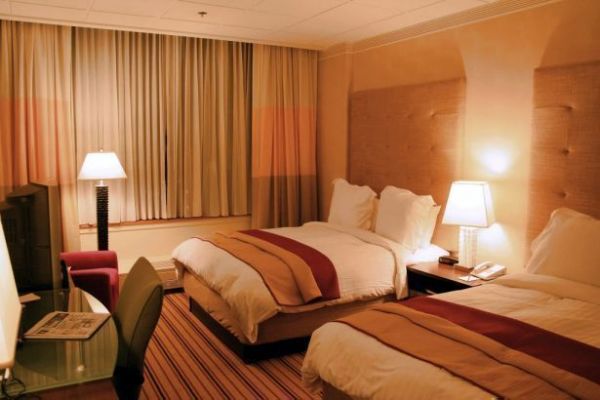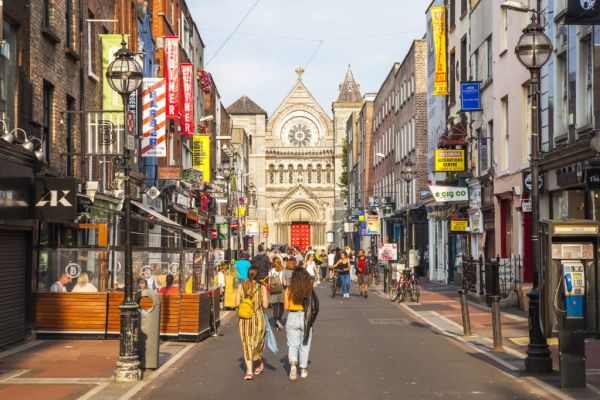Four Seasons founder Isadore Sharp doesn’t golf.
That might come as a surprise to guests at his Toronto hillside home where floor-to-ceiling windows offer a clear view of the lush fairways below at the Rosedale Golf Club in the city’s north end. “I had no time for golf,” the Canadian hotelier said.
“Issy” Sharp, 85, is still busy chipping away at the luxury hotel empire he started six decades ago in the red-light district of downtown Toronto. Spanning the dawn of overseas jet travel to a digital era of disruptors, Four Seasons Hotels and Resorts remains bound to Sharp’s guiding principle that he says crosses all cultures and religions: “If you treat people well, the way you would like to be treated, they will do the same.”
The builder-turned-lodging mogul believes the so-called Golden Rule is why the company will remain a dominant five-star player on the world stage even as rivals like Ritz-Carlton expand and new threats such as Airbnb emerge. Four Seasons eventually will grow from 105 properties in 43 countries to as many as 250 locations over time, he said. Rome is among markets of interest.
“We don’t see an upside limit at all because the marketplace has grown dramatically,” Sharp said in an interview earlier this month from his home/office adorned with paintings by Lawren Harris and other “Group of Seven” artists and an extensive porcelain collection curated by his wife Rosalie, an interior designer responsible for the look of several hotels.
Gates Support
Though he relinquished the chief executive post and day-to-day operations of the chain seven years ago, Sharp remains chairman and holds a 5 percent ownership stake following a 2007 buyout by Microsoft co-founder Bill Gates and Prince Al-Waleed bin Talal of Saudi Arabia. Sharp continues to wield “aesthetic” control, meaning he approves all of the closely held company’s “concepts.”
Gates and Al-Waleed are “very active in supporting management” and unlikely to sell their stakes, creating “certainty and stability” for Four Seasons’ more than 45,000 employees, said Sharp, adding that every person hired is interviewed at least four or five times to ensure the right fit.
“Sharp created the now legendary Four Seasons brand and unique culture based on his commitment to exceptional service and unrivaled luxury,” said Charles Zehren, spokesman for Cascade Investment LLC, Gates’ main investment vehicle. “We at Cascade are very proud to be associated with Issy and the entire team at Four Seasons, which is a valuable part of our long-term investment portfolio.”
Gates and the prince seek to make the company worth “a lot more” than the $3.7 billion valuation at the time of the 2007 deal that took the company private, said Sharp, who declined to comment on Four Seasons’ financial outlook except to say it has always turned a profit.
Avoid Debt
Sharp credits the strong balance sheet to being debt averse and steering clear of side businesses. Concepts pitched and rejected over the years included Four Seasons-branded nursing homes.
But the expansion in the mid 1980s to the hotel/residential model, which now accounts for about 80 percent of Four Seasons properties in the pipeline, was a natural fit, Sharp said. The idea, which first debuted in Boston, is to cater to customers interested in buying a home with Four Seasons branding and design, as well as access to hotel service and amenities.
The hotel chain now has some stand-alone residential properties, including one under construction in London, a market the company first entered in 1970 with a high-end hotel that became the “prototype of what we build to this day,” Sharp said.
Canada
The son of Polish Jewish immigrants, Sharp started adult life working for his father’s construction business after getting a degree in architecture. He chose to stay in Canada’s largest city in spite of blatant discrimination at the time.
“This golf course wouldn’t allow me to walk out there back then,” he said, gesturing to the Rosedale Club out his living-room window. Though Sharp doesn’t indulge in the sport, it’s in his blood: His father Max took up golf at about age 65 and shot a hole-in-one at 90, while his sister was club champion at her Toronto-area course.
Today, after decades of new immigrant arrivals, the now culturally diverse Toronto is a “great city because there are no minorities.”
Four Seasons Chief Executive Officer Allen Smith, who was hired four years ago to help the hotelier expand, says people are often surprised to learn the global company is based in Toronto.
“I occasionally meet people in Toronto who are surprised we are Toronto based,” said Smith, a dual U.S.-Canadian citizen who grew up in the U.S.
“There is a groundedness and real decency associated with Canadians in general in my experience. The principles that underlie the culture of the company, the Golden Rule, is very reflective of that,” Smith said in an interview at the Four Seasons in Toronto’s Yorkville district.
Apple Connection
Many aspects of today’s standard hotel service were started by Sharp. Four Seasons was first in providing shampoo and other toiletries, hairdryers and monogrammed bathrobes. It opened the first hotels in North America with a full-service spa and complimentary newspapers with room-service delivery. A focus on a comfortable mattress set off a hotel bed rivalry that continues today.
Steve Jobs, the Apple Inc. co-founder who died in 2011, took inspiration from Four Seasons when forming his company’s retail empire and approach to customer service, Carmine Gallo wrote in his book “The Apple Experience: Secrets to Building Insanely Great Customer Loyalty.”
“How much better of an endorsement can you get of what you are doing than one of the world’s greatest visionaries copying what you do,” said Sharp, who early on did things like change the pillows when he found out a politician stopped staying at the Toronto hotel because a rival had better ones.
These days, Sharp doesn’t go into the Toronto head office. His main focus now is spending time doing whatever his wife of 62 years wants to do. Still, it’s clear he puts a lot of thought into both the future of the company and industry.
New locations under consideration for Four Seasons include Rome, where Smith says the company is “conspicuously absent,” along with Venice and Nashville, Tennessee.
India Move
In China, Four Seasons has nine hotels and several under development. The company is also bullish on India, where the number of people moving from the farms into the city is said to be on the scale of all of Canada, according to Sharp.
Sharp isn’t worried about new arrivals such as Airbnb Inc., which he calls the “largest hotel company.” Marriott International Inc.’s Ritz-Carlton is “still the most formidable competitor because they are owned by one of the best hotel companies,” he said.
“Marriott builds as many hotels in one year as we operate,” Sharp said. “But we are the largest at this end of the market, therefore we have the competitive advantage.”
News by Bloomberg, edited by Hospitality Ireland









